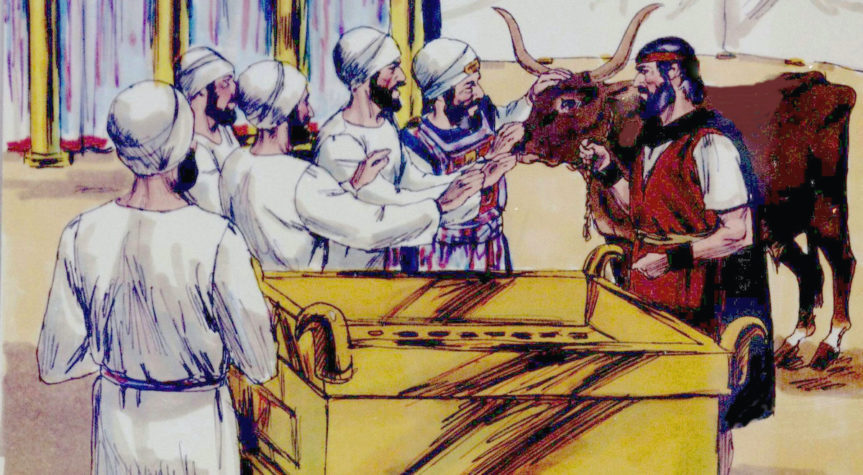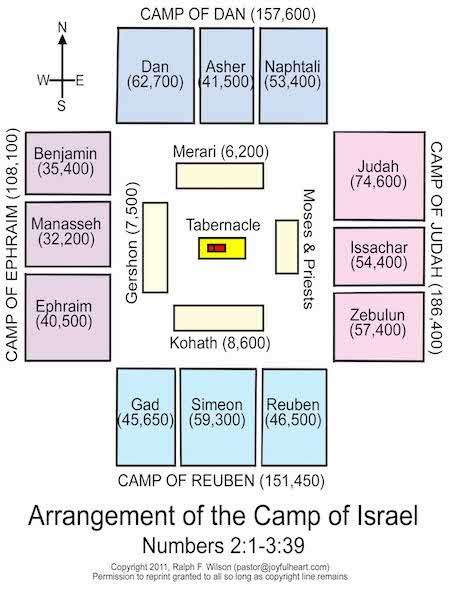We do not call church officers “Levites” and “priests” in the New Covenant. But does that really mean they are not entitled to the tithe?
This objection is summarized like this:
3 – Tithes were given to the Levites and priests, but there are no Levites and priests in the new covenant.
Levites and priests were tied to the sacrificial system of the old covenant. Now all believers are priests (1 Pet. 2:9; Rev. 1:6; 5:10; 20:6), with Jesus as our Melchizedekian high priest (Heb. 7).
The argument is basically this: tithes were given to Levites and priests. Since there are no Levites and priests in the New Covenant, there is no one to whom we can give a tithe, and the mandatory tithe passed away along with the sacrificial system of the Old Covenant.
That is, if you can get past the weird logical contradiction in which, immediately after saying there are no priests in the New Covenant, the author says that all believers are priests in the New Covenant.
How can there both not be priests, and be priests, at the same time? It’s like saying nothing and something exist together, at the same time. It makes no sense. It has to be one or the other.
He’s also implied that while all New Covenant believers are priests, this must not have been the case for Old Covenant believers. But that’s just not true. After the Israelites left Egypt, when they had camped at the foot of Mount Sinai, and when Moses went up to the mountain to receive the Ten Commandments, we read:
Moses went up to God. Yahweh called to him from the mountain and said, “You must tell the house of Jacob, the people of Israel: You have seen what I did to the Egyptians, how I carried you on eagles’ wings and brought you to myself. Now then, if you obediently listen to my voice and keep my covenant, then you will be my special possession from among all peoples, for all the earth is mine. You will be a kingdom of priests and a holy nation for me. These are the words that you must speak to the people of Israel” (Exodus 19:3-6).
God says repeatedly that Israel was set apart to be His holy people (Exodus 22:31, Deuteronomy 7:6, 1 Kings 8:53). Old Covenant Israel was also a kingdom of priests. All believing citizens were priests. They confessed with their mouths (Deut. 6:4-5) and took the sacraments of circumcision and Passover. In the New Covenant, we confess with our mouths (Romans 10:9-1) and take the sacraments of baptism and the Lord’s Supper.
The entire nation of Israel was priestly. Every citizen was a priest. But there were also higher orders of priests: the levites, the priests, and the high priest. Each one had greater responsibility than the other, but they could also draw nearer to God’s earthly throne than the lesser priests. In the New Testament, we can all draw near to God’s heavenly throne directly because Jesus is our high priest and our God. Therefore, there is no longer a need for the multiple orders of priests. There is only Jesus, our high priest. We can approach His heavenly throne in the true Holy of Holies in Heaven directly, with boldness and confidence (Heb. 4:16, 7:19; Eph. 3:12).
However, not all Christians are authorized to perform every earthly function in the church. The church has ordained officers, and those officers serve unique functions and take on greater responsibility.
WHY DID GOD GIVE THE TITHE TO THE LEVITES?
It helps to ask an important question that this critic of mandatory tithing did not ask: just why exactly did the Levites and priests collect the tithes? Of all the tribes, why the Levites?
First, Dr. Gary North explains the simple reason why it was the Levites and none of the others:
The Levites had been set aside by Moses, not because he was of the tribe of Levi, but because they had joined Moses when he called on all Israelites to execute God’s wrath against those who had participated in the worship of the golden calf. All those who joined had also worshipped the calf. The Levites publicly repented of their act of covenant-breaking. The evidence of the sincerity of their repentance was their execution of 3,000 non-Levites, who in turn were a representative token sample of all Israelites who deserved to die (Exodus 32:28). So, this was redemption by the shedding of blood.
The Levitical tithe was the God-mandated payment to the tribe of Levi for the tribe’s legal separation from specific plots of rural land in a single region. The tithe was part of a system of inheritance through separation from any specific region in Israel. The other tribes had inheritance through occupation of rural land in specific regions. The Levites were identified with the whole nation as no other tribe was. This was because they were uniquely identified with specific sacraments: animal sacrifices. The high priest conducted the bloody ritual associated with the holy of holies, where the Ark resided (Hebrews 9:7). The priests also administered covenantal meals and festivals.
The Covenantal Tithe, Chapter 5, pages 51-52
God set them apart so that they could perform the priestly services associated with the tabernacle and temple. Some have argued that the Levites chiefly performed social services, like providing schools and supporting the civil government.
Because some believe this is the reason why the Levites collected the tithe—because the performed these social functions—then they argue that it is permissible in the New Covenant to give your tithe to charitable and other institutions and people who also perform similar functions. They use this position to justify not tithing to the church.
SACRAMENTAL AND JUDICIAL, NOT SOCIAL
But anyone who argues this way has made a serious mistake. They have overlooked a crucial passage in the Bible. Scripture tells us exactly why the Levites collect the tithe, and it’s not for performing social functions. It was for administering the sacraments, and primarily this meant conducting the animal sacrifices: “To the descendants of Levi, look, I have given all the tithes in Israel as their inheritance in return for the service that they provide in working at the tent of meeting. From now on the people of Israel must not come near the tent of meeting, or they will be responsible for this sin and die” (Numbers 18:21-22).
The Levites were the judicial guardians of God’s household. They represented God to the people, and they represented the people to God. They guarded the sacraments. They prevented non-priests and non-Levites from drawing near to the holy ground. Only the priests and Levites could administer the sacrament of Passover and the other animal sacrifices.
So, we ought to be asking, are there church offices in the New Covenant that perform the same judicial function? In the Old Testament, God promised that there would be. When speaking of the New Heavens and New Earth, an age that was initiated with the coming of Christ, which has been progressing steadily since then, and which will be consummated at the Lord’s Second Coming, He said: “And I will also take of them for priests and for Levites, saith the LORD” (Isaiah 66:21).
Today, the church elders are vested with the equivalent authority and function of the Old Covenant priests and Levites. In what ways are they similar? Basically, they guard the church’s sacramental boundaries:
- Just like the priests in the Old Covenant (Leviticus 8), elders are ordained by other elders, not by laymen, and not by self-proclaiming themselves to be elders (Acts 13:2-4; Titus 1:5; Acts 14:23). Officers receive a special calling from above, represented by the ordination process
- The elders in the New Testament administer church discipline, try cases associated with ecclesiastical matters, and pronounce judgment, just as the levites did in the Old Testament (Lev. 13-14). There is a hierarchy of authority. The Old Testament had an appeals court system (Exodus 18:24-26; Deuteronomy 17:8-9) for administering justice. The harder cases of justice could be appealed to higher courts. This is the biblical structure of justice, and it is honored in certain New Testament church denominations.
- Elders control access to the sacraments. The Levites and priests set up squadrons of men around the temple and tabernacle to keep trespassers (strangers and unauthorized laymen) physically away from the holy places (Numbers 3). They alone were allowed to administer the sacrifices. In the New Testament, the elders are charged with administering the sacraments and defending their abuse from those who would unlawfully participate in the Lord’s Supper lest they suffer grave judgement (1 Cor. 11:27-29). When members are excommunicated, the elders are responsible for prohibiting the excommunicated member from participating in the Lord’s Supper.
Because of these three items, the elders, like the priests and Levites, are also entitled to the tithe and authorized distribute it on the Lord’s behalf.
For a free book on this topic, download and read Tithing and the Church. Some of the argumentation from Chapter 6, “Primary Sovereignty: Church or Family?” has been referenced for this article.
CONCLUSION
The elders in the New Covenant church guard and administer the sacraments, enforce church discipline, and stand as judges in the church courts. They preach the Word and guard the flock (1 Peter 5:1-2):
“Consider your leaders, those who spoke God’s word to you, and consider the result of their conduct. Imitate their faith” (Hebrews 13:7).
“Therefore be careful about yourselves, and about all the flock of which the Holy Spirit has made you overseers. Be careful to shepherd the church of God, which he purchased with his own blood. I know that after my departure, vicious wolves will come in among you and will not spare the flock” (Acts 20:28-29).
Melchizedek was not a Levite, and yet he received tithes. That is because his priesthood was superior to the Levitical priesthood as I explained in a previous article, and the lower priest tithes to the higher priest.
So this author, and any who expresses the same objection, is wrong. There may be no priests and Levites by name, but there are definitely priests and Levites by function. The Old Testament affirmed there would be. The historical church has concluded the pastors and elders fill this judicial role in the New Covenant church. And this is why they accept and administer the tithes on behalf of their high priest, Jesus Christ.


